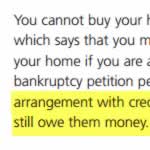A couple of readers have asked about mortgage fixes when they have a poor credit record or simply a lot of other debt: Ms A: We are in a DMP and we were told it would make it very hard to remortgage. So we are now on Santander’s SVR and it’s over 7%. Can we really just ask them for a new fix and they won’t say no? Mr B: I'm worried about talking to Nationwide when our current mortgage fix ends. … [Read more...]
Articles about Mortgages
. Mortgages are a "priority debt". If you are having difficulty paying the mortgage you need to take debt advice as soon as possible - the earlier you do this, the more options you are likely to have.
Mortgages are a "priority debt". If you are having difficulty paying the mortgage you need to take debt advice as soon as possible - the earlier you do this, the more options you are likely to have.
These pages list all Debt Camel articles about mortgages in date order. There is a general summary on this page Mortgages and Debt page.
Options if you have an interest-only mortgage
When an interest-only mortgage ends, you have to repay all the amount you borrowed. You can't just carry on paying the interest. The money to repay it can come from three sources: savings or investments; by getting a new mortgage; or by selling your house. How many interest-only mortgages are there? FCA research found that at the end of 2022: There are now fewer than 1 million … [Read more...]
Support for Mortgage Interest (SMI) – should you take this loan?
Support for Mortgage Interest (SMI) helps some people with the cost of their mortgage if they aren't working. Since 2018 this help has been paid as a loan secured on your house, not a benefit, see the gov.uk page on SMI. But this loan is cheap, you don't have to make any repayments to it until the house is sold and it does not show on your credit record, so this is not as bad as it … [Read more...]
Can I get a mortgage with recent defaults?
A reader, Mr D, asked: My partner and I have a combined income of £56,000, We have a deposit of £28,000 (inheritance) and are looking to become first time buyers at a price of £230,000. We have defaulted debts that are being paid off, and previous history of payday loans from over 2 years ago from a time when our financial situation was much more difficult. The defaults are about 18 months … [Read more...]
I’m in a DMP – can I get a mortgage?
A reader asked about applying for a mortgage when she is in a Debt Management Plan (DMP): "I have been in a DMP for 8 years and still have 6 to go as I still owe £16,000. With hindsight, I should have gone bankrupt! My parents will give us a 20% deposit in 2021, but they don't know about my debts so I can't use their money to end the DMP. Will I be able to get a mortgage?" This case highlights … [Read more...]
“Can mortgage lenders see old debts, no longer on my credit record?”
A reader asked: I know a debt drops off my credit file 6 years after it was settled or defaulted. I just want to ask when I apply for a mortgage, can the lender dig up unpaid debts if they are no longer showing on my credit report? This is a common question. The answer is Yes, sometimes because a lender can see other information that may show the debts. Let's look at what the lender can see, … [Read more...]
Recent payday loans make it hard to get a mortgage
Having a recent payday loan on your credit history can make it much harder for you to get a mortgage at a good rate - or even at all! If you have used payday loans, the rule of thumb for a mortgage application is to wait until at least 2 years have passed after your last payday loan was settled. Before coronavirus, the usual advice was to wait one year. But from 2020 many mortgage lenders … [Read more...]
“Can I use the Right to Buy my council house when I have debts?”
A reader asked: I moved in with my parents into their council house several years ago and we are looking into the right to buy scheme. We received the paperwork and it stated that you are not entitled to the right to buy if you owe money to creditors. Five years ago I lost my job and had a relationship breakup and unfortunately got into debt. Two accounts were defaulted and I went into a payment … [Read more...]
Bankruptcy, IVA, DRO & your credit rating
If your debts are so bad that you are going to have to choose one of the three types of insolvency, you know this will wreck your credit rating, but how long will this continue? This article answers this and other you may have about the effect of insolvency on your credit record such as Will you ever be able to get credit again? What about a mortgage? Is bankruptcy worse than an IVA or a DRO for … [Read more...]
Repossession after bankruptcy – be careful!
What do you need to do if you want your house to be repossessed after you go bankrupt in England, Wales or Northern Ireland? Perhaps the house is unaffordable, has negative equity, or it's the wrong size for you. For whatever reason, you want to move out, are happy for the mortgage lender to repossess and may want to "hand back the keys" as fast as possible to get it all over with. The … [Read more...]









